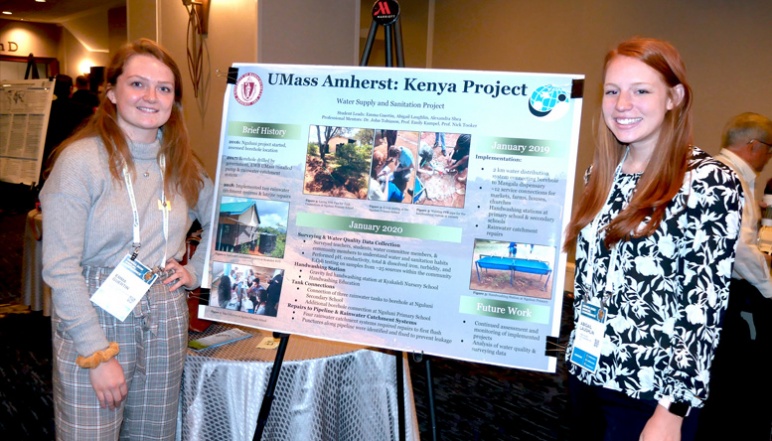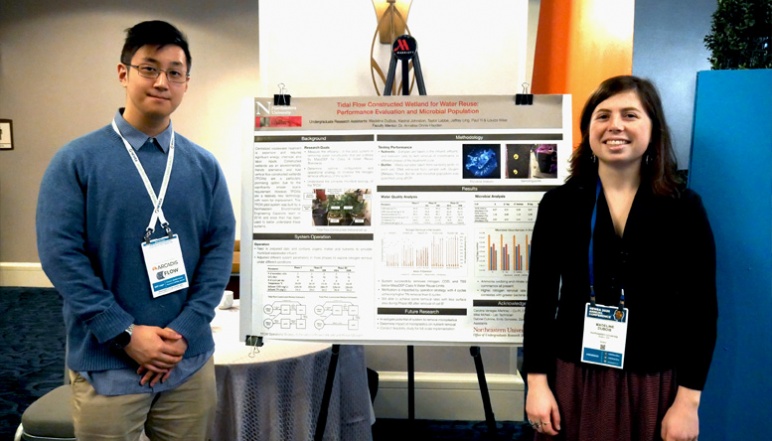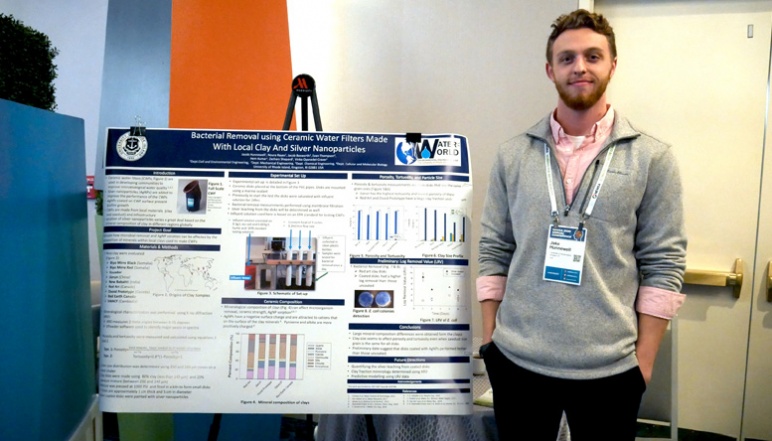News Students tackling pressing water issues: J-WAFS at NEWEA student poster contest
Oona Gaffney, Communications and Program Assistant February 5, 2020

Emma Guertin, University of Massachusetts Amherst (left) and Abigail Laughlin University of Massachusetts Amherst (right) presenting on their research project: Kenya Project: Water Supply and Sanitation Project. Credit: Oona Gaffney, J-WAFS

Paul Yi, 5th Year at Northeastern University (left) and Madeline DuBois, 5th Year at Northeastern University (right) presenting their research project: Tidal Flow Constructed Wetland for Water Reuse. Credit: Oona Gaffney, J-WAFS

Jacob Hunnewell of the University of Rhode Island presenting on his project: Bacterial Removal using Ceramic Water Filter Made with Local Clay and Silver Nanoparticles. Credit: Oona Gaffney, J-WAFS
One of my first assignments as J-WAFS’ new communications and project assistant was to attend the New England Water Environment Association’s (NEWEA) annual conference. J-WAFS has long been aware of NEWEA and its work—including this conference—so it was a great opportunity to represent J-WAFS while also learning a lot through the student poster competition at the event. The NEWEA annual conference enables New England water industry experts to connect and exchange information on state-of-the-art innovations and advancements on an array of different water challenges. Students pursuing research and careers in water-related fields can showcase their research at the poster session, network with water professionals, and learn about opportunities in the water industry.
As an environmental science major at Northeastern University, I enjoyed hearing from and learning about the work being done by other students who are also passionate about addressing water issues. The undergraduate poster competition included 24 students from eight different universities in the New England region. Among the topics students addressed were water access, wastewater treatment, water filtration strategies, and water impact strategies. The research topics were inspiring to me in their ingenuity and detail, and the presenting students were passionate, driven, and motivated in their approach to addressing urgent water issues.
One student I spoke to was Emma Guertin of UMass Amherst. “I always wanted to do some sort of water or environmental engineering before I came to college,” she told me, “and I found the science behind water quality so fascinating.” Emma, who studies environmental engineering, along with Abigail Laughlin (a chemical engineering student at UMass Amherst), presented on an on-going project that the UMass Amherst chapter of Engineers Without Borders is sponsoring to provide access to water access and sanitation in Nguluni, Kenya. Abigail talked about how, before her experience traveling to Kenya, she “had not previously understood the actual water crisis or realized that the amount of water we (Americans) use every day is insane compared to what they (Nguluni) have access to.” Water scarcity and intermittent supply are severe challenges that are faced by many impoverished communities around the world. Researchers at MIT are responding to these challenges as well. Professor Andrew Whittle, the Edmund K. Turner Professor of Civil Engineering in MIT’s Department of Civil and Environmental Engineering, was awarded two-year J-WAFS seed Grant in 2019. He and MIT graduate student Sophia Wu are examining how water quality is affected by the intermittent operation of urban water distribution systems.
Madeline DuBois and Paul Yi, both senior environmental engineering majors at Northeastern University, focused their research on wastewater treatment for non-potable reuse. “We need more circular systems where we are reusing water and putting less of a strain on our limited resources.” Madeline said. She sees changing the public stigma against water reuse as one of the biggest water challenges as climate change and growing populations continue to impact our water cycle.
Among the other projects presented was an analysis of the effectiveness of ceramic water filters on bacteria removal from drinking water, and also soil bank stabilization along water bodies to address challenges of erosion in water resource areas. “People don’t have the same opportunities, they don’t have the same water quality that we have” said Jacob Hunnewell of University of Rhode Island, who is working on the ceramic filters project, “and that is the one thing that is necessary for life.” J-WAFS is already supporting numerous projects that help rural, poor, and remote communities access clean drinking water, among them an open-sourced water filter made of wood and a wearable test kit that quickly assesses E. coli contamination in drinking water in Nepal.
As water issues continue to impact communities around the world, J-WAFS supports researchers across MIT who are applying their efforts to water and food systems challenges. Through research funding, student grants, and support for the MIT Water Club, J-WAFS is helping to grow the community of students at MIT who are working on solutions. Having the opportunity last week to talk with promising young engineers outside of MIT who are passionate about solving water-issues makes me all the more confident that my generation is making great strides to address urgent water crisis.